Positive Health Online
Your Country

META-Kinetics: A Synthesis of META-Medicine and Cyberkinetics
by Joanne Ross, Robert Waghmare and Tremayne Reiss(more info)
listed in kinesiology, originally published in issue 182 - May 2011
Synopsis
This article introduces META-Kinetics, an exciting new development in mind-body medicine. It is a fusion of two powerful disciplines: Cyberkinetics, a form of advanced kinesiology, and META-Medicine, an advanced system of health understanding. META-Kinetics is of interest to those seeking a deeper understanding of mind-body medicine, taking us beyond risk factors into the unconscious causes of our health challenges.
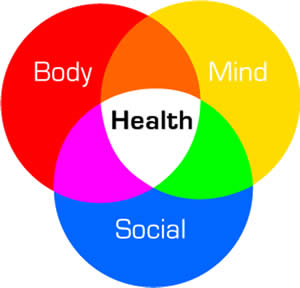
Figure 1: Mind-Body-Social Health
Part 1: META-Medicine - A New Model of Health Understanding
The first piece of the jigsaw was META-Medicine. Robert and I were working as life coaches and looking for a scientifically-based approach to mind-body healing that would give us a deeper understanding of clients' issues. Also at the back of Robert's mind was his experience of a childhood kidney illness - modern medicine had never been able to explain why he'd experienced it.
Searching online in 2005, Robert came across the International META-Medicine Association (IMMA)[1] and META-Medicine seemed to fill in those missing links! Five years later, we are the UK's first META-Medicine Master Trainers and are furthering the field with the development of META-Kinetics.
What is META-Medicine?
META-Medicine is a comprehensive and multi-dimensional system of health understanding. It explains how all symptoms are bio-logically meaningful, rather than a mistake of nature. Going beyond the current concepts of risk factors, such as lifestyle factors, genetic heredity,[2] germ theory and biomechanics, META-Medicine offers an accurate and reproducible explanation of the specific bio-emotional causes behind specific symptoms.
The term meta from the Greek means to 'go above and beyond'. META-Medicine occupies a uniquely integrative position in the field of healthcare, bringing together professionals from modern, complementary and alternative medicine. It provides a common basis of knowledge and a diagnostic process for getting to the root cause of client's issues, and enhances practitioners' precision and results.
Is it Possible that Illness is Meaningful?
One of the most prevalent underlying beliefs about health in the Western world is that illness is a mistake. Many people assume that we must simply eradicate symptoms in order to restore health. Mistrusting the body's ability to self-heal, we often seek a quick fix, whether conventional or alternative, to suppress or remove 'problem symptoms'. This results in a deep and widespread fear of illness.
META-Medicine enables a conscious shift from fearing symptoms to understanding the bio-logical and evolutionary meaning behind them. We can begin to trust the body again.
The META-Medicine Principles
META-Medicine is based on ten core principles, the first four of which we will introduce here.
Principle 1: Symptoms are Bio-logically Meaningful Reactions
Rather than random errors, META-Medicine shows how all symptoms are meaningful responses to specific emotional stimuli. To work out why a particular symptom appears, we first identify the function of the organ. Then we can uncover why we experience a change in function.
For example, the tendons and ligaments in the knee enable us to walk, run, kick and move forwards. If an individual has a knee problem, such as inflammation, this indicates a corresponding issue with their capability to kick something away or move forwards in an area of their life. They feel stuck and incapable. It's no wonder football players often get knee injuries!
Principle 2: The Synchronous Unity of Mind, Body and Social Behaviour
META-Medicine is a bio-psycho-social system, demonstrating the interconnectedness of all aspects of our being - biological, psychological, social and emotional.
For example, take a client with chronic lower back pain. META-Medicine enables us to perceive the connection between the back ache (biological), the client's low self-belief (psychological), feelings of inferiority (emotional) and submissive or dominant behaviour with family members and colleagues (social).
Principle 3: Stressful Events Mark the Beginning of a Dis-ease
With the exception of poisoning, malnutrition and physical trauma, the beginning of illness can be traced back to significant emotional events (SEEs). These are negative life events which are unexpected, momentarily throw us of balance, cause a specific physiological reaction and become held in memory. Examples of SEEs include receiving bad news, an unexpected conflict or social humiliation. Emotion is key: the emotion felt in the moment of shock determines which symptoms develop in response.
Recent research in neuroscience, such as that by Dr Joseph LeDoux, demonstrates that emotions are subconscious brain-based control systems that shape our biological responses, and are far more powerful in determining our reactions than our conscious mind.[3]
After the initial event, we only need to experience the same emotion (such as feeling powerless and unable to speak up) in response to a similar situation (such as hearing aggression in someone's voice) to re-trigger the same symptom pattern (such as laryngitis). These stimulus-response patterns are neurologically bound and programme our thoughts, feelings, physiology and behaviour, leading to chronic health issues.
Principle 4: Symptoms are part of a meaningful dis-ease cycle
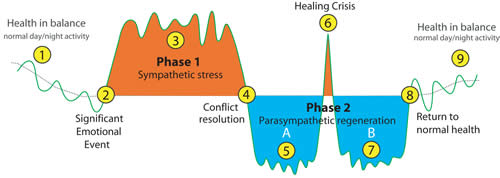
Figure 2: The Two Phases
When we experience a stressful event or trigger (for example, being shouted at), we enter into Phase 1. This is characterized by obsessive thinking about the stressful situation, nervousness, tension, sleeplessness and other fight-flight symptoms. We remain in this state until the problem is resolved, either through a real-life change or through unconsciously letting go.
When we let go, we drop into Phase 2. Energy moves from the mental to the physical body to enable us to recover from the preceding stress and regain balance. The general signs of regeneration include tiredness, increased appetite, fever, and mental haziness. Most of the typical symptoms we've labelled as 'illness' are experienced during this phase, including headaches, diarrhoea, cramps, colds and 'flu, stomach bugs, and musculoskeletal aches and pains. Far from being a mistake, they are an integral part of healing!
Understanding Health as Balance
In modern Western society, the regeneration phase tends to be viewed as a problem to be avoided! META-Medicine redresses this misconception, encouraging us to honour the natural rhythm of our organism and take time to heal.
A New Definition of Health
With META-Medicine, our perception of health changes from that of an absence of illness or symptoms to a conscious journey, in which our symptoms enable us to look deeper into ourselves, and transcend our hidden issues. Instead of blaming the body for our symptoms, dis-ease is seen as a meaningful process, an integral part of human existence, and the path to healing becomes a journey of personal and spiritual development.
The Neuro-scientific Basis of META-Medicine
A key feature that sets META-Medicine apart from other systems of health understanding is its basis in brain relay research. It is already well established that there is an organ-brain connection. META-Medicine takes this understanding further, demonstrating with the aid of CT (Computer Tomography) scan evidence that the brain acts as a mind-body interface: specific regions of the brain relay information to and from specific organs. When we experience a SEE, the shock registers as a marking in the area of the brain which directs the relevant organ.
The original research in brain relay diagnostics was undertaken by German medical doctors in the 1980s, most notably the controversial Ryke Geerd Hamer.[4] This mapping of the organ-brain connection is now available to META-Medicine students and practitioners. It provides practitioners with a solid scientific (verifiable and testable) understanding of the organ-brain-psyche connection, which can be corroborated with client testimony.
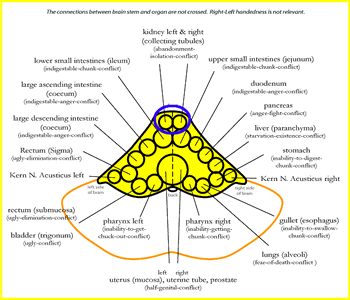
Figure 3: META-Medicine Brain Map of the Brain Stem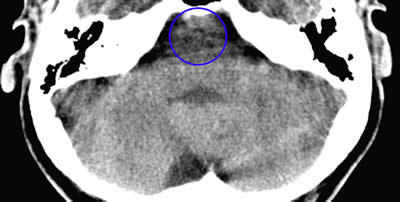
Figure 4: Robert Waghmare's Brain CT of the Brain Stem, showing markings in the area
corresponding to the kidney collecting tubules (taken in 2006)
The META-Medicine Enquiry Process
The META-Medicine questioning process, along with an understanding of the Two Phases, enables META-Medicine practitioners to uncover why a client is experiencing a particular symptom, and track back to the specific bio-logical and emotional cause in the client's life. For Robert, this was the convincer: he finally found out why he had developed kidney disease, and why it remained a chronic process for sixteen years.
The enquiry process precedes therapy: once we know the reason behind the health issue, we can identify and apply the most appropriate therapies for each client in a more precise way.
Part 2: Cyberkinetics - 'The Body Never Lies'
The next piece of the puzzle came through our colleague, Tremayne Reiss. An avid explorer of consciousness, Tremayne had already completed a degree in Herbal Medicine and trained in META-Medicine when he met Alan Sales (now deceased), founder of Cyberkinetics, 'by chance' at a conference. For a moving tribute see www.positivehealth.com/author/alan-sales/alan-sales

Figure 5: Leonardo da Vinci's Vitruvian Man
What is Kinesiology and How is it Used?
The word Kinesiology comes from the Greek work kinesis, meaning motion. In the medical sciences it is the name given to the study of muscles and the movement of the body. Testing the muscle response has long been used in conventional medicine to assess the motor system.
In the 1960s, Chiropractor George Goodheart discovered that muscle testing could reveal much more than motor function, and developed the system of Applied Kinesiology. Touch for Health followed in the 1970s, and many forms of Kinesiology have since been developed.[5]
In the complementary health field today, Kinesiology is primarily used to identify imbalances in the body's structural, chemical, emotional or other energetic systems, to establish the body's priority healing needs, and to evaluate energy changes brought about by therapeutic procedures.
Kinesiology is based on the premise that we can access the unconscious mind through the muscles, which are in a delta state, thus largely bypassing conscious thinking processes. A muscle test provides information via nerve pathways and the meridian system.
Cyberkinetics: A Quantum Leap
Cyberkinetics was developed by the late Alan Sales, who was a control systems engineer before becoming a master Kinesiologist. He was thus familiar with Cybernetics, the study of systems and processes, explaining how living systems constantly adapt to their environment through continual monitoring and feedback loops.[6]
Cyberkinetics is a distillation of the best aspects of various schools of Kinesiology with some new discoveries based on cybernetic thinking.
One of Alan's discoveries was analogue muscle testing. Before this, Kinesiologists used the binary system. Imagine a light switch in binary - it is either on or off. Analogue muscle testing is like a dimmer switch. It grades the intensity of light through a full spectrum. It thus gives more sensitive and accurate feedback, reflecting the dynamic nature of life.[7]
The Human Body Field

Figure 6: Depiction of human body fields
Research has revealed that our bodies have their own energy and information fields which direct and control the processes within the physical body. While awareness of these fields has been used in many healing systems throughout history, they are now being mapped out and understood in a comprehensive way.[8] With Cyberkinetics, it appears that we are communicating directly with the body field.[9]
Part 3: The Emergence of META-Kinetics
After the first fortuitous meeting between Alan and Tremayne, the two started experimenting with using Cyberkinetics with META-Medicine. META-Kinetics was born.
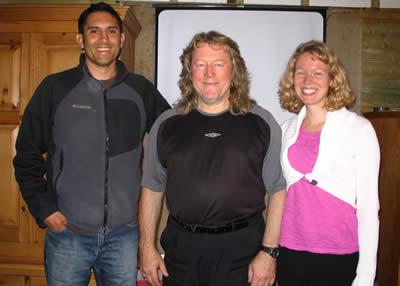
Figure 7: Robert and Joanne with Alan Sales in 2008
It opens up exciting doors into the field of mind-body medicine. Practitioners now have a way of calibrating the information clients present, removing much of the ambiguity of conversational analysis. We can use META-Kinetics to elicit information about the root cause of a symptom, uncover the beliefs and emotions keeping a client stuck, and ask the body which therapeutic interventions are needed.
Huge amounts of information can be navigated and filtered rapidly. Previously, practitioners had to make a mental decision about where to start and what to focus on; now we can ask the inherent wisdom of the body field.
Some of the applications of META-Kinetics we've used thus far include:
Performing health scans to reveal which organs are under stress and why;- Pinpointing the significant emotional events behind health issues;
- Identifying the specific triggers for chronic issues;
- Uncovering blocking beliefs and emotional barriers;
- Discharging stress and correcting energetic imbalances;
- Establishing the precise therapeutic interventions required;
- Conducting further research into the mind-body-social connection.
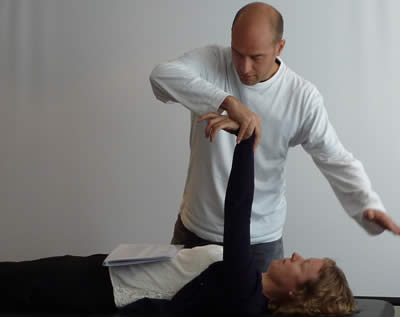
Figure 8: Tremayne Reiss demonstrating META-Kinetics during a training course
META-Kinetics has given us an invaluable tool for exploration and revolutionized the way we work with clients. For students of META-Medicine, the interaction and kinaesthetic dimension META-Kinetics provides brings mind-body-social analysis to life.
Becoming proficient with muscle testing takes time but the reward is massive. The hardest part is letting go of what you think you know and surrendering to universal consciousness. As Einstein said "the only thing which gets in the way of my learning is my education".
References
1. www.metamedicine.info Our original training was with Johannes Fisslinger, whose book is available in German - Fisslinger J. Das META-Medizin Handbuch. ISBN 978-3932576713. 2006
2. See Lipton B. The Biology of Belief. Mountain of Love/Elite Books. Santa Rosa. ISBN 0-9759914-7-7. 2005.
3. LeDoux J. Synaptic Self. Penguin Books. New York. ISBN 0-14-200178-3. 2002.
4. Hamer RG. Scientific Chart of Germanic New Medicine, Spain. ISBN 978-84-96127-29-6. 2007.
5. Thie J. & Thie M.. Touch For Health. DeVorss & Co. Camarillo. ISBN 978-0-87516-812-8. 2005.
6. Wiener, N. Cybernetics: or control and communication in the animal and the machine. MIT Press, Cambridge, Massachusetts. ISBN 978-0-262-73009-9. 1961.
7. Sales, A. Cyberkinetics: Advanced Techniques in Kinesiology. Module 1 Workshop Manual. 2005.
8. Sheldrake, R. Morphic Resonance: The Nature of Formative Causation. Park Street Press, Vermont. ISBN 978-159477317-4. 4th edn. 2009 & Fraser P. & Massey, H. Decoding the Human Body-Field. Healing Arts Press, Rochester, Vermont. ISBN 978-1594772252, 2008.
9. Sales, A. Cyberkinetics: Advanced Techniques in Kinesiology. Module 6 Workshop Manual. 2009.
Comments:
-
No Article Comments available